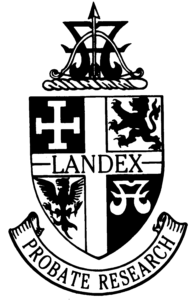
Do not hesitate to contact us with any questions, but these are some of the most common questions we get about what we do.
Why have I been contacted?
Our office has been advised that an estate matter exists whereby some or all of the beneficiaries are missing or unknown to the court. You have been contacted because our research into the decedent’s family history has led us to you. Based on our findings, we believe you may be entitled to receive funds from this pending estate matter of which you are completely unaware.
How did Landex Research get involved in this particular estate matter?
Typically, our cases originate in one of three ways:
- We are contacted by a judge, an attorney, a trust officer or an estate administrator who has requested our assistance in locating missing individuals to complete an heirship.
- We monitor probate estates at courthouses throughout the United States and search for new estate matters that appear to have an incomplete heirship.
- We are contacted by a corresponding office in another city or another country who has requested our assistance in utilizing local resources to help locate certain individuals for a pending estate matter.
How can I be certain that pursuing this inheritance will justify my time and effort?
While the amount inherited varies widely from case to case, our office does not engage in extensive research to locate you unless we believe it is worthwhile for you to receive an inheritance and for us to receive a fee. Once you sign our agreement, our office does all of the work for you. The entire process requires little work on your part.
How do I know this is legitimate?
We fully understand most people approach our letter with a certain amount of skepticism. Landex Research receives its fees only after services have been performed and our clients have received a financial benefit. At no time will any member of our staff or anyone affiliated with our office ask you to front any money for expenses. We are a family business in continuous operation for more than 60 years. Our company has developed an excellent reputation among the legal community. We welcome your inquiries to the Better Business Bureau, the Chicagoland Chamber of Commerce, and various attorneys with whom we have worked. We are confident our record speaks for itself.
Wouldn’t it make more sense for the estate to pay for research expenses instead of me?
It is possible the attorney for the estate is unaware that additional heirs exist. Without our reviewing files, many heirs would be overlooked completely on their legal entitlement. If the estate incurs research expenses, then known heirs would actually be paying to locate unknown heirs. Our fee is paid by the individuals who benefit the most from our services.
How long does the probate process take?
Usually, one to two years from the time we first contact you. While court backlogs vary, our experienced legal advisors work hard to conclude cases as quickly and efficiently as possible.
Who determines my appropriate share of the estate?
Your share is determined by the probate court based on the laws of descent and distribution in the locale in which the matter is handled.
Can I be held liable for the decedent’s debts?
Absolutely not. The decedent’s debts are deducted from the assets of the estate prior to distribution. The worst possible scenario is that the estate would be insolvent, and you would inherit nothing.
Am I responsible for estate taxes?
No. Typically, any and all estate taxes are paid by the estate prior to distribution. The funds you receive are usually free and clear of any estate tax liabilities. Always consult a tax advisor for more detailed questions.
If I do not inherit from this matter, am I under any financial obligation to Landex Research for locating me?
No. Landex Research assumes all of the risk. If it turns out there are no funds for you, we simply advise you of such and close our file.
What will happen if I do nothing in this matter?
If you choose not to pursue this matter at all, it is very possible that your share may ultimately be deposited with a state Treasurer’s office as escheated funds, thus benefiting no one. The time and legal costs to claim these funds at a later date may be more significant than our costs. In many cases, however, other individuals who are in touch with the estate and represented by legal counsel may be claiming the funds that we believe are due to you. In the absence of your being represented in the estate, a judge could award these funds to the other claimants. This, of course, is to your detriment and something that we seek to avoid.

